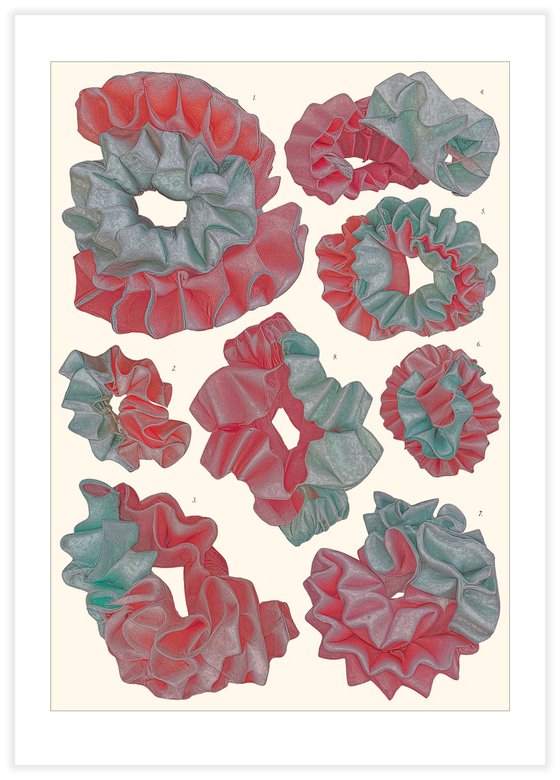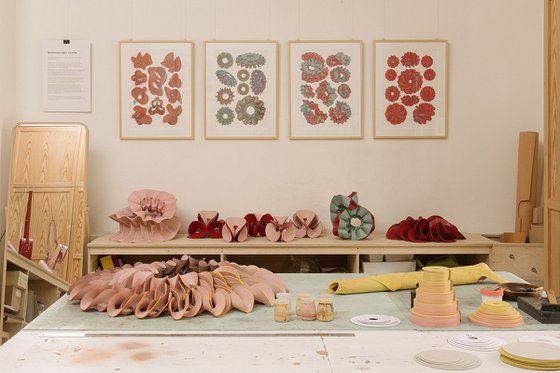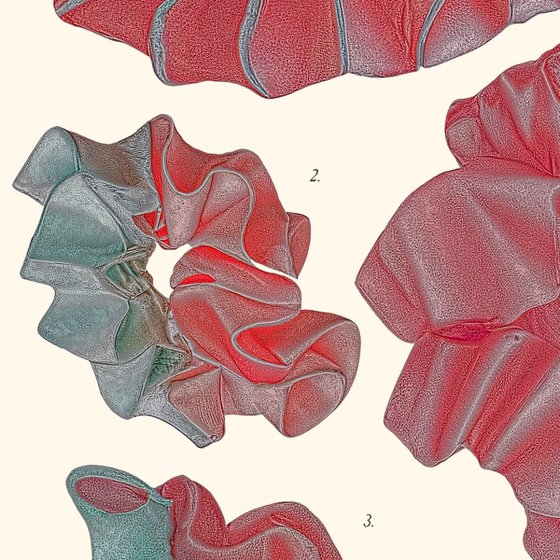- By medium
- By subject
- By budget
- Sales
- Gift cards
- Discover all art
- Artists
- Editors’ picks
- Ideas
Artwork description:
The artwork 'Morchella Fucata' is a part of my art print series called 'Nonexistent species'. It is based on the photographs of leather sculptures I started creating during the Covid lockdown.
My regularly structured objects consisting of repeating elements reflect on organic structures found in nature. Their slow growth is the result of meticulous and elaborate handwork. Characteristics of plants, marine animals, fungi and vertebrates can also be found in them: they are closely related to each other, but their species cannot be determined.
Mapping the evolution of non-existent species was made possible by artificial intelligence, the most rapidly developing technological achievement today. The system developed by OpenAI, Dall-E, is able to generate new versions based on photos uploaded to its user interface, thereby creating virtual branches of the original artefact. From the resulting images I created imaginary taxonomic figures, with the use the traditional compositional techniques of natural science illustration. The resulting graphics were given their final form after digital post-processing.
Their visual world pays tribute to the German biologist Ernst Haeckel. In his scientific works he further developed the theory of Darwinism, discovered many new species and also documented them in his artistic lithographs. Haeckel's name is linked to creating the basic law of biogenetics, the essence of which is, that more advanced organisms during their embryonic development go through states corresponding to the earlier stages of their evolution. His theory was extended to the field of psychology as well, stating that the spiritual development of the individual is related to tribal development, as it takes place during similar repetitions.
The artwork is a numbered and signed Giclée print, on fine quality artistic paper, in A2 format.
Tags:
#surrealism #scientific illustration #biological abstraction #haeckel #biological formsMorchella Fucata (2023) Digital Art (Giclée)
by Vanda Berecz
£192.53
- Digital Art (Giclée) on Paper
- From a limited edition of 100
- Size: 41.9 x 59.4cm
- Signed and numbered on the front
- Style: Illustrative
- Subject: Abstract and non-figurative
Loading
Artwork description
The artwork 'Morchella Fucata' is a part of my art print series called 'Nonexistent species'. It is based on the photographs of leather sculptures I started creating during the Covid lockdown.
My regularly structured objects consisting of repeating elements reflect on organic structures found in nature. Their slow growth is the result of meticulous and elaborate handwork. Characteristics of plants, marine animals, fungi and vertebrates can also be found in them: they are closely related to each other, but their species cannot be determined.
Mapping the evolution of non-existent species was made possible by artificial intelligence, the most rapidly developing technological achievement today. The system developed by OpenAI, Dall-E, is able to generate new versions based on photos uploaded to its user interface, thereby creating virtual branches of the original artefact. From the resulting images I created imaginary taxonomic figures, with the use the traditional compositional techniques of natural science illustration. The resulting graphics were given their final form after digital post-processing.
Their visual world pays tribute to the German biologist Ernst Haeckel. In his scientific works he further developed the theory of Darwinism, discovered many new species and also documented them in his artistic lithographs. Haeckel's name is linked to creating the basic law of biogenetics, the essence of which is, that more advanced organisms during their embryonic development go through states corresponding to the earlier stages of their evolution. His theory was extended to the field of psychology as well, stating that the spiritual development of the individual is related to tribal development, as it takes place during similar repetitions.
The artwork is a numbered and signed Giclée print, on fine quality artistic paper, in A2 format.
Tags:
#surrealism #scientific illustration #biological abstraction #haeckel #biological forms14 day money back guaranteeLearn more



